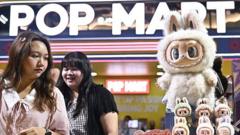Pop Mart, the Chinese toy manufacturer famous for its Labubu dolls, has announced an astonishing profit forecast for the first half of this year, projecting a rise of at least 350% as revenues surge above three times their previous figures. The Beijing-based company, valued at over $40 billion (£31.6 billion), attributes this significant profitability boost to heightened global brand visibility and stringent cost-management practices.
The collectible Labubu dolls, characterized by their unique elf-like appearance and distinct jagged teeth, have captivated consumers worldwide, leading to long queues in stores as enthusiasts clamor for the sought-after products. Pop Mart has effectively capitalized on this trend through its innovative "blind box" sales strategy, a marketing technique that conceals the toy within packaging until opened, which has been criticized for fostering compulsive buying akin to gambling behavior.
Since launching in 2019, the Labubu doll line has positioned Pop Mart as a major player within the retail sector, boasting over 2,000 locations including vending machines across the globe. Following its stock market debut on the Hong Kong Stock Exchange in 2020, Pop Mart's valuation has skyrocketed close to 600% within just one year.
Notably, sales from international markets outside of mainland China comprised nearly 40% of Pop Mart's total revenue in 2024. Despite overwhelming demand forcing many stores to temporarily suspend Labubu doll sales, the brand's recent ascent in the United States—propelled by high-profile endorsements from celebrities such as Kim Kardashian and Lisa from K-pop sensation Blackpink—has significantly boosted its global appeal.
Collaborations with renowned brands like Coca-Cola and the popular manga franchise One Piece have further solidified the prominence of Labubu dolls. Recent data from equity research firm M Science noted that Labubu sales in the U.S. soared by an astonishing 5,000% in June compared to the previous year, a feat not observed among peer companies according to senior analyst Vinci Zhang.
While Pop Mart's U.S. presence remains modest—with about 40 retail locations compared to approximately 400 in China—the surge in demand has generated a thriving resale market where original dolls priced near $10 can resell for hundreds, with a life-sized Labubu fetching a staggering $150,000 at a Beijing auction.
However, the rampant popularity of Labubu dolls has also spurred a rise in counterfeits, dubbed Lafufu dolls, with Chinese authorities seizing over 46,000 fake toys in June amidst intensifying efforts to curtail black market activity in the collectible space.















